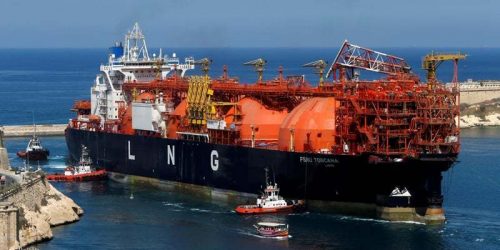ISLAMABAD:
At a time when the government is looking to end monopoly of state-run companies in the liquefied natural gas (LNG) market by allowing private sector to import LNG, Pakistan LNG Limited (PLL) has come up with a proposal for increase in its margins – a move which will put more burden on consumers.
PLL is importing two contract cargoes of LNG every month. At the same time, it is importing a few spot cargoes, forcing consumers to utilise gas at higher prices.
Owing to inefficiency and poor management of LNG imports, the private sector has refused to consume the expensive imported gas.
Earlier, PLL failed to prepare a proper strategy to arrange LNG supplies when prices crashed in the international market due to the Covid-19 pandemic. Instead, it later floated tenders when prices shot up to all-time highs.
Because of imports at higher prices, the Cabinet Committee on Energy exempted LNG-based power plants from 66% guaranteed offtake.
At present, the consumers are paying several charges on supply of imported gas. State companies – Pakistan State Oil (PSO), PLL, Pakistan LNG Terminals Limited (PLTL), Sui Southern Gas Company and Sui Northern Gas Pipelines Limited (SNGPL) – are charging margins on LNG imports and supply.
Compressed natural gas (CNG) filling stations are supplied imported gas at actual prices whereas other sectors like fertiliser and textile are receiving LNG at discounted rates. In Pakistan, the major LNG consumer is now the domestic sector.
In a bid to overcome gas shortage, the government diverted LNG to domestic consumers in winters, which added billions of rupees to the circular debt. It is a new form of inter-corporate debt in the energy chain that has added to the miseries of current government, which is struggling to arrest the runaway debt.
Though LNG consumers are already paying margins to different companies, PLL has now sought an increase in its margins.
Special Assistant to Prime Minister on Petroleum Nadeem Babar recently informed the Asian Development Bank that the private sector would start buying and selling LNG in April this year.
The private sector has struggled for years to win permission for LNG import and has not been able to bring a single cargo, though the second LNG terminal has some idle capacity.
Petroleum Division Special Secretary Nadeem Irshad Kiyani has written a letter to the Oil and Gas Regulatory Authority (Ogra), seeking higher margins on LNG imports.
He asked Ogra to allow the application of 3.75% margins with effect from June 1, 2018 based on a decision of the Economic Coordination Committee (ECC) of the cabinet.
The decision was taken on May 30, 2018 – before the Pakistan Tehreek-e-Insaf (PTI) came to power. PLL is currently receiving margins of 2.5%. It has also demanded recovery of $30.13 million based on 3.75% margins.
The response of Petroleum Division spokesman was awaited till the filing of the story.
Market players pointed out that the government had allowed the industry fixed margins and were surprised over the collection of margins in percentage.
They asked the government to set the margins like those for oil marketing companies (OMCs) and dealers in the oil sector. Moreover, they urged the government to reduce margins on LNG imports as a result of merger of PLL and PLTL.
According to industry sources, the PLL management has recently made a manifold increase in the pay of its employees which, they say, is unjustified and contrary to the government’s austerity drive.
This comes despite that the company will only import two LNG cargoes per month whereas the remaining four cargoes will be bought by the private sector.
Officials suggested that the government should come out of the current business model and should liberalise the market for private sector, which is willing to bear all financial risks. Owing to the involvement of state companies, the circular debt is rising. PSO is to receive Rs110 billion from SNGPL on account of LNG supply whereas PLL is to receive Rs61 billion from SNGPL for LNG deliveries. Meanwhile, SNGPL has not been able to recover over Rs81 billion from domestic consumers due to diversion of LNG supplies to them in winters.
In this scenario, allowing private consumers to import LNG would lessen financial risk on the government and slash the circular debt, said officials.





